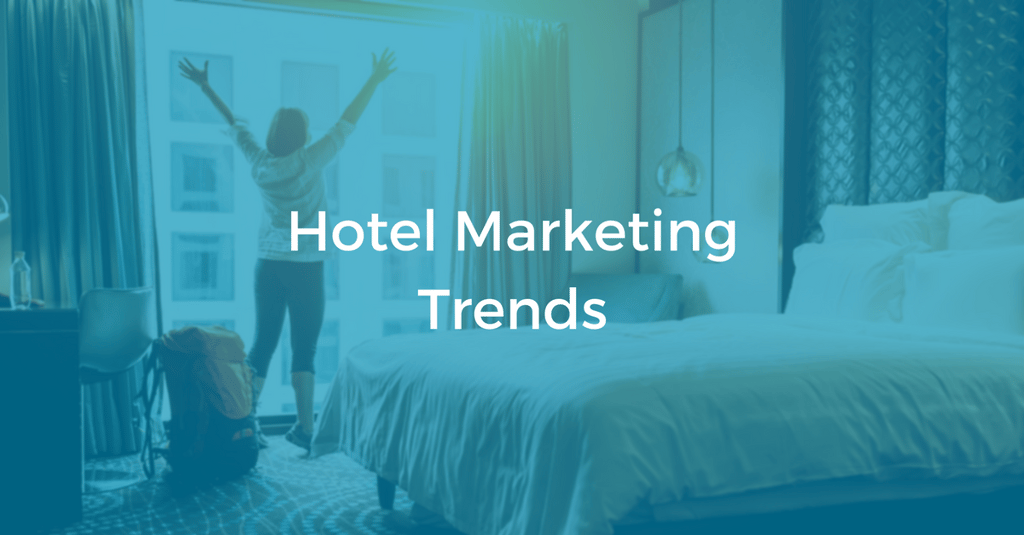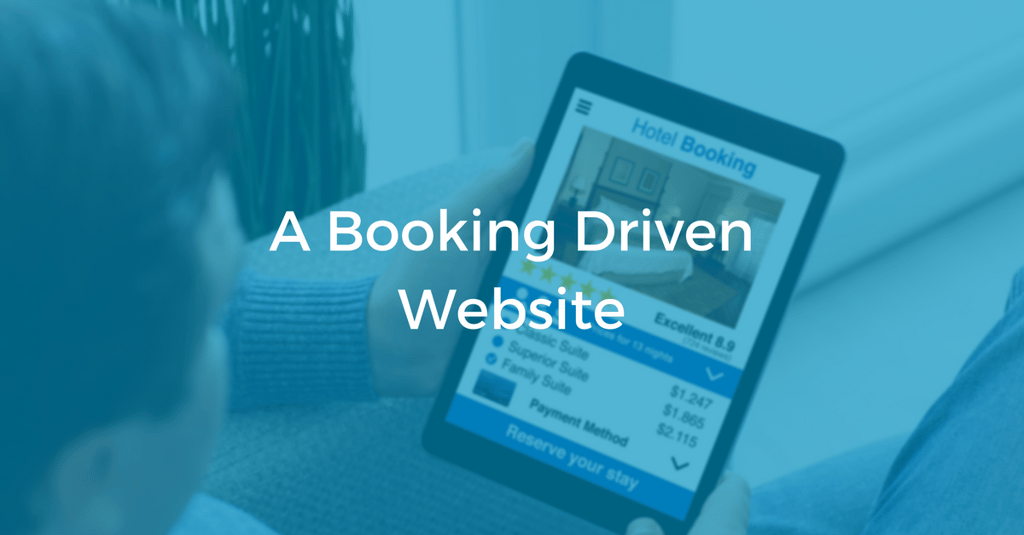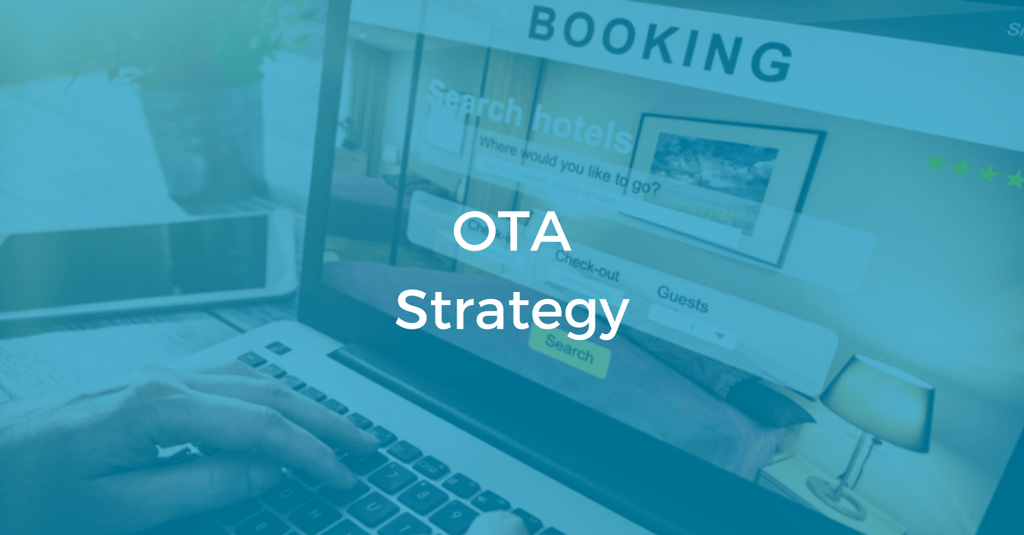Google introduced micro-moments 2 years ago, and since then, they’ve only multiplied. They’re changing the way travelers choose their hotels and it’s never been more important to show up at the right time with exactly what they’re searching for.
Successful hotel marketing will be about advising prospective guests to ultimately empower them to choose you as their best option. Increased friction in the booking process will lead to failure, and impersonal messages will be ignored.
In this guide, we highlight some key trends in hotel marketing and take a deep, data-driven dive into the following aspects of a comprehensive marketing plan:
Ready? Let’s get started!

As you strive to provide your guests with the best experience possible, it’s important that you stay up to date on marketing trends to keep your competitive edge. Early adoption of newer marketing techniques can be great, but remember that your marketing needs to be centered around your guests in order for it to be centered around revenue.
Here are a few trends we expect to see.
As you’ll quickly notice reading through this guide, we use the word experience A LOT. That’s because as a hotel, you don’t necessarily have a single product or service you give to your guests. While you have a wide variety of services you provide for them, their stay is so much more than how great your housekeeping staff tidies up their room.
Your hotel provides a unique experience that your guests can’t get anywhere else. Focusing on providing an experience also allows you to reduce the common marketing problem of only focusing on top of funnel tactics. Instead, you can tailor your messages to exactly where each person is and develop a relationship with them around a positive experience.
Two years ago, Google highlighted the importance of being there for guests as they turn to their mobile devices for in-the-moment searches. These “micro-moments” have come to make up essential parts of the booking journey which we’ll talk about in greater detail in the next section.
Mobile searches have skyrocketed over the last two years. In fact, 3 out of 4 smartphone owners turn to mobile search before anything else to address their immediate needs. Digging deeper into the data, we also find that travel related searches for “tonight” and “today” have grown over 150% on mobile.
Not only have mobile search trends shown an increase in the “I-want-it-now” mentality among consumers, but guests are actively searching for more routine purchasing decisions as well. For instance, searches for “Best travel accessories” has grown over 110% in the last two years.
Put simply, your hotel’s website needs to be fully functional when and where your guests are viewing it.
Reviews have always been an important part of hotel marketing, but sometimes they can prove difficult to obtain. Luckily, people share their experience on social media for the world to see. User generated content is leveraging the content members of your community share to positively reinforce your marketing efforts.
Social proof is a powerful tool to utilize in marketing. Effectively capturing and utilizing this content empowers you to connect with the 45% of millennials that look at user generated content when researching the right hotel, and the 88% of people who trust online reviews as much as they trust a recommendation from friends and family. Seeing that someone else had a great experience reassures them that they’re making the right decision.
Check out our full list of 8 Hotel Marketing Trends to watch out for.

The first step to implementing a successful hotel marketing plan is understanding your audience. What are they looking for in a hotel? More importantly, are you showing up at the right moments in their journey towards booking a room?
There’s a lot of planning that goes into travelling, and finding the right hotel is the cornerstone for a positive trip. However, the process is one that changes from guest to guest. Looking at trends and search behavior, we can break up the booking process into a series of 4 types of micro-moments that span the entire booking process.
Micro-Moments can best be explained by whipping your smartphone out when you need an immediate answer to a question or a solution to a problem. Understanding these moments is crucial for your hotel marketing as you can advise your guests and empower them to make the right decision.
The four travel micro-moments include “I-want-to-get-away”, “Time-to-make-a-plan”, “Let’s-book-it”, and ”Can’t-wait-to-adventure”.
These moments are known as “dreaming” moments. People at this stage don’t have any firm plans, and are looking for inspiration on a destination. This could stem from having disposable income, to seeing their friends recent vacation pics on Instagram.
Once people know where they’re headed, the next step is setting a date and working out the details about how to get there, where to stay, and what to do during their stay. This is likely where most of your marketing is focused.
These moments are exciting for guests. It’s the moment when everything is aligned, and people are ready to reserve their room and book the flight. It’s where they make their dreams from I-want-to-get-away moments into a reality.
These are the moments of anticipation leading up to the trip, and even more when they finally arrive. 9 out of 10 travelers expect their travel provider to share relevant information during their trip so make sure you’re actively improving their experience.

Once you have an in-depth understanding of how your guests typically end up choosing your hotel, it’s time to make sure your website empowers them to act on their decision. Your website is your biggest digital marketing asset and serves as your own travel agent. It needs to be balanced between helping your guests find the information they’re looking for and generating revenue for your hotel.
Your hotel website needs to invite guests to click around and explore the experience you can provide. Think of your website as a digital version of your hotel. They check in when they land on one of your pages, check out is when they leave your site, and instead of “guest experience” for everything in between, this is user experience. So, what goes into a great user experience? While there are countless hotel web design tips we could give you to create a great user experience, you want to make sure your website follows these 3 best practices.
1. Your Website Must be Structured
The first thing people notice about your site is its structure and organization. When guests are active in their research process, it’s important to layout your content in a clean, logical way that’s easy to navigate. Just like you wouldn’t want a guest going into a room that hasn’t been made up, you don’t want your website to appear cluttered or distracting.
Your website needs to be able to answer the question or solution to a problem your guests are actively looking for. Does the purpose of the page align with the reason they arrived? Do you engage your prospective guests with a next step to keep them on your site? You want to create a website that answers questions, and becomes a source of impactful information for your audience.
Lastly, you need to make sure that your website has smooth functionality. Whether it’s encouraging guests to sign up for loyalty programs or directly booking their room, the function of your site is what fuels the results of your hotel’s digital marketing strategy.
To get the most out of your hotel’s website, it’s best to think of it as an investment instead of a project to revisit every two or three years. User behavior and preferences change, and as we see from the trends mentioned earlier, 2 years is plenty of time for your site to become outdated and misaligned with the goals of your guests.
Unfortunately, there’s no such thing as a perfect website. What’s perfect for one person could be a disaster for another. Similarly, your hotel isn’t the right choice for some travelers, and just right for others.
To really make your website work for your hotel, you need to analyze and learn from the guests who use your site. This way you can tailor the user experience to align with their goals, speak their language, and drive bookings.

Hotels across the world continue to compete with online travel agency (OTA) monsters. Some might look at OTAs as the biggest source of referral traffic to their website while others might think of them as a form of self-competition. After all, if someone books a room at your hotel through one of them, they take a hefty percentage of your revenue when the guest could have just as easily booked directly on your site.
Your OTA strategy needs to be creative and adaptive to drive direct bookings. Let’s dive deeper.
If half the bookings you received from OTAs were direct, how much more money would that be in your pocket? Did you know that 52% of users click through to a hotel’s website from an OTA to check it out for themselves? This is why your website is so vitally important for your hotel. Your website is the first impression of the experiences, memories, and stories guests will be able to share with the world.
People who are clicking through from OTAs are typically in the “Time-to-make-a-plan” stage of the booking process. Make sure your site has a section for people to plan out their stay. The more you can integrate other aspects of travelling, such as rental cars or flights, the better.
The goal is to get users to forget about the long list of hotels and to get them to start imagining themselves staying with you.

Content is everything you put on your website and it’s what keeps users engaged on your site. From branding, images, and videos, your content tells a story that puts your audience as the main character. Effective content gets guests to visualize themselves staying at your hotel and forget about the OTA they most likely came from. Ultimately, the content on your site needs to provide results, in this case, bookings.
Your content strategy should aim to advise your guests to make the right decision for their stay. You should aim to be helpful rather than overly self-promotional. It’s important that you leverage content in your marketing in a way that is relevant to where your guests are in their booking process. Here are a few effective ways to use content for each type of micro-moment.
I-want-to-get-away: These users have increasingly been watching videos about different destinations and what to do during their stay. In fact, among travelers who watch travel-related videos, 64% watched them when they were thinking about taking a trip. A video that highlights unique and exciting things to do during their stay is a great way to get them to start dreaming about their stay with you.
Time-to-make-a-plan: It’s time to empower that right choice and give them a reason why staying at your hotel will give them a better experience than the one down the street. Since you don’t have much wiggle room on price due to rate parity clauses, you need another way of increasing the value. Offer a loyalty club that provides them with exclusive benefits such as a room upgrade, transportation to and from the airport, or anything that makes their planning, easier.
Let’s-book-it: Keep your content as simplistic as possible during these moments. Mobile bookings are increasing and 45% of travelers with smartphones said they would switch sites if there are too many steps to book or get desired information. 52% said they’d switch if the site took too long to load. Keep it branded, but emphasize user experience and proper functionality to ensure there are no issues.
I-can’t-wait-to-explore: These moments are when their I-want-to-get-away dreams start turning into a reality. Leading up to their arrival, you can send them blog posts such as “Essentials for a great stay in (insert destination)”. With 85% of leisure travelers deciding on activities only after arriving, it’s important that you keep your guests in the loop with things to do so you can empower them to have the trip they’ve been dreaming about.
Regularly publishing content on your hotel’s blog is extremely beneficial to your every aspect of your hotel marketing plan. When done correctly, your blog will boost your site’s SEO, give your social media and email teams valuable information to send to prospective guests, and allow you to share news and updates happening around your hotel.
Your blog can be a resource in any moment of the booking process so it’s important to have a variety of posts that focus on each one. As people turn towards search engines to find answers to their questions, your blog is what enables you to provide them with a focused solution.
Content marketing for hotels really makes a difference when you can effectively personalize the content on the individual level. This goes farther than using their name in the first line of an email. While personalization tokens are great and have their place, they’re not meant to be used everywhere. The real personalization comes from context.
In other words, the content you provide your audience, whether it be on social media or through their email inbox, there needs to be a reason behind why they’re receiving it. They need to be able to relate to it and apply it to where they are in the booking process. A great way to ensure your content is relevant to your audience is to implement lifecycle marketing.
Lifecycle marketing is a personalized marketing strategy that supports the progression of prospective guests and guests through each stage of the booking process by delivering hyper-targeted messages to advise them to choose your hotel. For example, each phase of moments in the booking process could be a lifecycle stage. When they move from dreaming to planning, the content you share with them should reflect this to continually build upon the guest experience.
.png?width=1024&name=Hotel%20Content%20Marketing%20(1).png)
Social media plays an integral role in the guest booking process. In fact, it’s used throughout the entire process for different reasons which is why it’s so important in your marketing strategy. From the “I want to get away” moments to the “just take me back” moments, people turn to social media to learn about and share the experience you provide.
However, social media isn’t typically the last touch before conversion and its influence is likely to get overlooked. Understanding the role social media plays in your guests’ booking decision prevents you from overlooking this valuable marketing channel.
Social media plays more of a supporting role for your hotel marketing strategy, however you can’t let it fall by the wayside. Just like your blog, your hotel's social channels will be researched, viewed, and compared with your competitors at any moment in the guest experience.
Social media can often be the origin of the I-want-to-get-away dreams that guests have. They could have seen one of their friends post about their awesome honeymoon in Hawaii or a video of them ziplining through the rainforest in Central America.
During the Time-to-make-a-plan moments, people will look up pictures with relevant hashtags on Instagram and read reviews on Facebook. Even though search engines are usually the go-to source for answers, people will turn to social channels to see previous guests’ side of the story.
As people shift into the “Let’s book it” moments, they use the information they found across your social channels to make a decision they’re confident in. Since guests can’t book a room from their newsfeed, retargeting ad campaigns can encourage ready-to-book guests to come back to your site and book directly. For more creative ways to drive bookings through social media, check out this blog.
Once the reservations are made and the rooms are booked, many people are excited to let the world know they’re going somewhere great. A few weeks prior to the trip, guests might post “Ugh, I can’t wait to be on vacation”. You can take advantage of these posts by implementing social monitoring and responding in a way that build upon their excitement.
Social media technology has advanced so much in the last couple years that guests can stream live video directly to their networks. With the advent of Facebook and Instagram stories, it’s never been easier for your guests to share their experience with the social community.
Circling back to the trend of user generated content, social media is the breeding ground for collecting positive experiences and leveraging them across your marketing channels. As people share their travel dreams becoming a reality, they indirectly provide content for people in the I-want-to-get-away and time-to-make-a-plan moments.
Make it a point to reach out to people who explain a positive experience and try to get permission to use their content on your page. It shows your guests that you’re listening to what they’re saying about you, and makes them feel important.
User generated content is a win-win-win situation. It provides you with free marketing content, delights guests past their stay, and gives you valuable feedback on the experience you provided.
Taking UGC a step further, you can also utilize influencer marketing in your hotel marketing to connect with potential guests through social media.
Influencer marketing is utilizing online leaders who have the power to affect purchase decisions because of their (real or perceived) authority, knowledge, position, or relationship to communicate a great guest experience to the community.
Here are 4 notable advantages influencer marketing provides your hotel.
First and foremost, influencer marketing can usually fit into a marketing plan of any size. If you’re a smaller boutique hotel you probably don’t have the budget to bring someone with celebrity status to take a few pictures and share them on their accounts. By using micro-influencers, you can utilize people who have a smaller following than celebrities, but a strong, loyal audience.
People turn to other people for reassurance of their purchases. They don’t want to feel like they wasted their money. Influencers take social proof to a whole new level. With 82% of people saying they’re likely to follow the recommendations of a micro-influencer, it shows how much impact an influencer marketing campaign can have for your hotel.
Influencers break down the wall of distrust people have with branded marketing messages. The content they share isn’t viewed as marketing since it’s coming from someone they already feel like they know on a personal level. Reviews from influencers can have massive impact on guests active in the booking process.
Influencers can be a great way to get economy-sharing crazed millennials into one of your hotel rooms. With 37% of millennials having a distrust in bigger businesses, and 51% saying consumer opinions on a company’s website have a greater impact on purchase decisions than recommendations from friends and family, influencers are a great way to build trust and nurture a strong guest relationship.
Social media also serves as a bridge between inbound marketing and traditional paid advertising. Inbound marketing is the process of attracting visitors to your site with valuable and helpful content to empower an informed purchase decision (sound familiar?) and traditional marketing is putting dollars to a targeted campaign to drive results.
Advertising on social media is a cost-effective way to get in front of your ideal guests and push them closer to booking their reservation. For instance, one of many social advertising tactics that is often overlooked is Facebook’s Engagement Custom Audience.
Instead of focusing only on demographic and psychographic data to determine who gets shown your ad, this approach only targets people who have already engaged with your content. People are more likely to purchase from brands they engage with on social, and coupling this with a retargeting campaign can keep your prospective guests engaged and curious about your hotel.
.png?width=1024&name=Hotel%20Content%20Marketing%20(2).png)
While people go to social media find key information about your hotel, search engines will almost always be the starting point for their research process. It’s engrained in all of us, just Google it. With hotel listings showing up right on Google’s results pages now, it’s never been easier for guests to view their options, and it’s never been harder for hotels to become one.
Google shared their finding on micro-moments two years ago and gave hotel marketers a preview into how you can effectively show up for your travel customers at crucial points in their research process. Since then, mico-moments have multiplied. It’s become the norm for user search behavior and they’re increasing the right-here, right now expectations in the minds of consumers.
Unfortunately, hotels face immense organic competition from giant online travel agents such as Expedia and Priceline, so hotel SEO is anything but a cookie cutter, one-size fits all solution. Instead, you need to tailor your content and keyword strategy to focus on topics that your guests will be searching for in these different moments.
You want your hotel to become an advisor for travelers. Doing extensive keyword and competition analysis and understanding when and where people are searching for your guidance will empower your hotel to be there with the answer whenever they need it.
It can be overwhelming to think about all the different factors that Google’s algorithm considers when determining how your pages rank. To spare you the details, and hours upon hours of research you could do, it’s best to keep search engine’s ultimate goal at the forefront of your SEO strategy.
Search engines aim to provide users with webpages that provide the most useful, relevant, and complete answer, solution, or explanation based on what the user has typed into the search bar.
As you aim to answer your guests’ questions, here are 5 important ranking factors that will impact your SEO efforts.
As noted above, the primary goal for search engines is to provide the best possible answer to what was searched for. However, it goes a step further and determines how well you can answer logical follow up questions as well. If you don’t provide a full solution for your guests, it could be impacting your ability to rank.
Mobile searches for “best” have grown over 80% in the past two years (example: “Best Hotel in Hollywood”). Not only do people want their answers right away, but they want the best answer right away. However, search engines have never stayed at a hotel, so how do they determine what’s best? Reviews.
Getting links to your hotel’s website from other relevant sites increases your site’s credibility in the eyes of search engines. Other than boosting your street cred with Google, backlinks impact your referral traffic’s user behavior. You want to make sure it makes sense for them to arrive on your page from where they came from.
Google posts are a newer element within your Google My Business listing that highlight upcoming events, sales, offers, and news. This means you could highlight an upcoming event your hosting in your conference center or your guest loyalty program right on the search engine results page.
As of October 2017, Google Chrome displays a warning message to users who attempt to visit an HTTP page. With approximately 50% of internet users using Chrome as their browser, it’s important that you update your SSL certificate and to avoid scaring away guests that could be attempting to book their room.
Increasing your organic traffic as a hotel is no easy feat. As you compete against giant travel agents as well as your local competitors, showing up is sometimes the hardest part.
Even though it’s become increasingly difficult to get your pages to rank on the first page for booking oriented searches, the hospitality industry is one of the only industries with specific capabilities directly within the search engine results page. Google Hotel Ads integrate directly with your data feeds to provide real-time updates on vacancies and how much you’re willing to spend to fill your empty rooms.
Even though set up and management of these ads can be a bit on the technical side of things, these ads will allow you to compete with OTAs directly on the first page of search results, and capture more direct bookings.
Switching perspective back to your guests, Google Hotel Ads have never been more helpful. Users comparing hotels in the midst of it’s-time-to-plan moments can see price, overall rating, a highlight of amenities as well as map out the location of each hotel, all without leaving the Google results page.
As you determine your budget and plan your hotel marketing strategy, finding the right balance between organic and paid efforts is crucial. If you invest too heavily in organic and don’t utilize any paid, it’ll be close to impossible for you to get your booking page on the first page of results.
On the other hand, if you only invest in paid you’ll fail to show up for the crucial moments in the guest booking journey making it difficult for you to stay in front of your guests and get them excited about their trip.
We like to look at each approach as a supporting role for your search engine marketing. In fact, hotel ads and optimizing for organic traffic are geared towards showing up at different moments in the guest booking journey. Because of this, your paid and organic efforts should work together to pull your guests closer to clicking the book now button.

Email is the most personal of all digital marketing channels. This is because guests expect to receive specific information that’s relevant to their stay. If you posted this on social media, chances are they’d cancel their visit entirely. Email is where you connect and engage with your guests and deliver the personalized experience they’re looking for.
Unfortunately, many hotel email strategies begin right when a guest books their room with a follow-up confirmation email. While this is a must-have email campaign, it doesn’t necessarily drive home any added value for your guest. It’s a reactive email approach and doesn’t begin to provide your hotel with the ROI that email marketing can generate.
When you take a proactive marketing approach, you leverage your content in creative ways to gather prospective guests email address and other valuable information about what they’re looking for. From there, you send them targeted campaigns that speak to the information they gave you and instead of having to wait for them to find you answers, you’re serving solutions to them on a silver plate.
Guests expect to receive specific information that’s only for them, whereas if you posted this information in a blog post you’d likely get a few cancellations. Treating your emails as a one to one conversation will establish trust and build a relationship around creating a personalized travel experience.
Getting guests to sign up for loyalty programs is an extremely effective way to gather guest data and consistently deliver relevant and timely emails. With proper email segmentation, your emails can empower you to stay one step ahead of guests and answer questions they didn’t even know they had yet.
When your emails effectively nurture guests to book at your hotel, they can be confident that they made the right choice. They already have a glimpse as to what to expect service wise when they arrive, and their excitement levels are high.
Once they’re in the I-Can’t-Wait-to-Explore stage, email is a great way to keep them excited about their trip. In the two to three weeks leading up to their reservation, send them information about events going on while they’ll be in town. Send them a packing checklist so they don’t forget something important. Send them a countdown email when their trip is a few days away to let it sink in.
Successful hotel email marketing gets your guests excited and prepared for a positive stay, long before they walk through your lobby doors.
.png?width=1024&name=Hotel%20Email%20Marketing%20(1).png)
Congratulations! You’ve got a guest in their room with your awesome marketing. Now it’s time to exceed their expectations. Seeing how much of the research and booking process is done digitally, keep the wheels moving. Incorporate digital elements in the guest experience to further personalize their stay and be more than just another hotel.
For the duration of their stay, your guests rely heavily on mobile to get around, make reservations, and find information. In fact, smartphone searches at hotels increased about 30% in the last year alone. An app puts all this information in one place and simplifies it for them.
Unfortunately, the data shows a disconnect between the guest’s desire for relevant information upon arrival and downloading an app to centralize this information. While only 23% of travelers saying they’ve downloaded a travel app, nearly 90% expect relevant information from their travel provider.
Encourage guests to download your app to enhance their stay. Make sure they know that everything they’ll need for their stay will be in that single location and if they need anything else, the front desk is just a tap away.
Just as the majority of the booking process is done digitally, you can digitalize the experience they have by including functionalities such as quick check-in and check-out options, order room service, see a calendar of events and activities in the local community, and don’t forget about weather updates!
To really go the extra mile, allow them to plan an itinerary directly on the app. You can then use their schedule to send them relevant information that could make their experience better.
As guests interact with your website, they’re producing data that can be leveraged to tailoring their experience to fit their needs. For instance, if a guest is in town with their family, send information about family activities they might enjoy. On the other hand, if a couple is travelling for their honeymoon, offer them a complimentary massage at your spa.
Every piece of data your users generate as they engage and interact with your website can give you valuable insight as to who your guests are and what they’re looking for from your hotel.

One of the most important things for your hotel to actively work towards is building a strong online reputation through reviews. Whether you focus on TripAdvisor, Facebook, Google, or another popular review site, what your guests have to say about your hotel has more of an influence on prospective guests than your branded messages. Make sure you’re leveraging them to your advantage.
Your prospective guests are turning to the internet to reassure themselves that they’re making the right decision. This means having quality reviews is becoming more and more important for your hotel marketing strategy.
Encourage your guests to leave reviews. This can be in the form of a review campaign and the goal is to increase the number of reviews for your hotel, but there’s a fine line between getting as many reviews as possible, and ensuring they’re helpful to people considering your hotel.
Timing is everything for review campaigns. You want to give your guests the opportunity to review when the experience is still fresh in their mind, but asking too soon can feel like you’re using their stay as a marketing ploy. Make them feel valued and listen.
We mentioned earlier that reviews can help your hotel increase rankings on search engines, but reviews provide you with multiple other benefits as well.
Guest feedback is often the most overlooked benefit of hotel review campaigns. It’s essential that you pay attention to what your guests are saying about their stay, so you can continually strive to create a better experience for them.
Having done a good amount of marketing for hotels, we’ve dealt with TripAdvisor enough to understand how it fits into your strategy. Having a great TripAdvisor ranking is great, and something to be proud of. However, when it comes to promoting it on your website, we often advise against it.
Why? Because it’s a distraction to the guests who are looking to book their room. It takes prospective guests away from your website, and gives them the opportunity to consider your competitors. In fact, if you use the TripAdvisor widget on your website, chances are TripAdvisor will start competing with you to show up for your branded keywords.
To keep your guests focused on a stay with you, it’s best to avoid any distractions that could potentially lead them to your competition.
.png?width=1024&name=Encouraging%20Reviews%20(1).png)
Even though your hotel might not be a resort where families travel to each year, the ultimate goal is to have your hotel come to mind if a past guest is travelling to your city. Anything can work once. The real success is establishing a system that consistently works again and again.
When it’s all said and done, you have a good amount of data after a guest stays at your hotel. When using each aspect outlined in this guide, you’ll have collected the reason of their travel, what tier of room they stayed in, the activities they enjoyed, and their overall perceived value of the experience you provided.
This is the information you can leverage to bring these guests back through your doors. If they came for a business convention, set up an automated message to reach out to them when similar events are going on. If they came for a family vacation, help them plan for the next time the kids have off school.
The data you collect on your guests before, during, and after their stay is crucial to lowering your marketing costs and creating repeat guests.
After seeing what the hotel marketing landscape has become, are you ready for what's ahead? Do you know your guests enough to give them the experience they’re looking for? Whether it be a calm, no stress business stay, or a family vacation full of exciting activities, do you deliver what they want?
Look at where your hotel is right now, then look at where you want it to be this time next year. Is what you’re doing going to get you there? Are you showing up for the moments that matter in the increasingly digital guest booking journey?
If you need help planning or executing your strategy, we’d love to help you get on track to not only reach your goals, but surpass them. We’ve helped multiple hotels connect with prospective guests and create experiences that keep them coming back. We’d be happy to empower you to do the same.
6. Engaging the Social Community
2000 Palm Beach Lakes Blvd
Suite 601
West Palm Beach, FL 33409
P: 561.832.6262
F: 561.832.7707
2018 Copyright THAT Agency - All Rights Reserved.